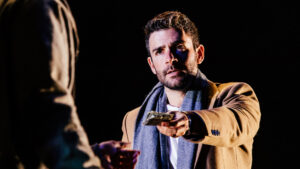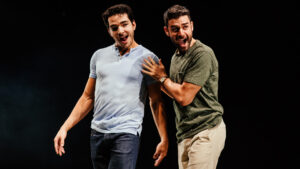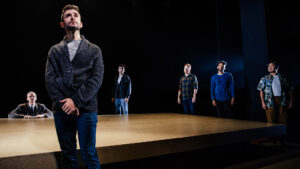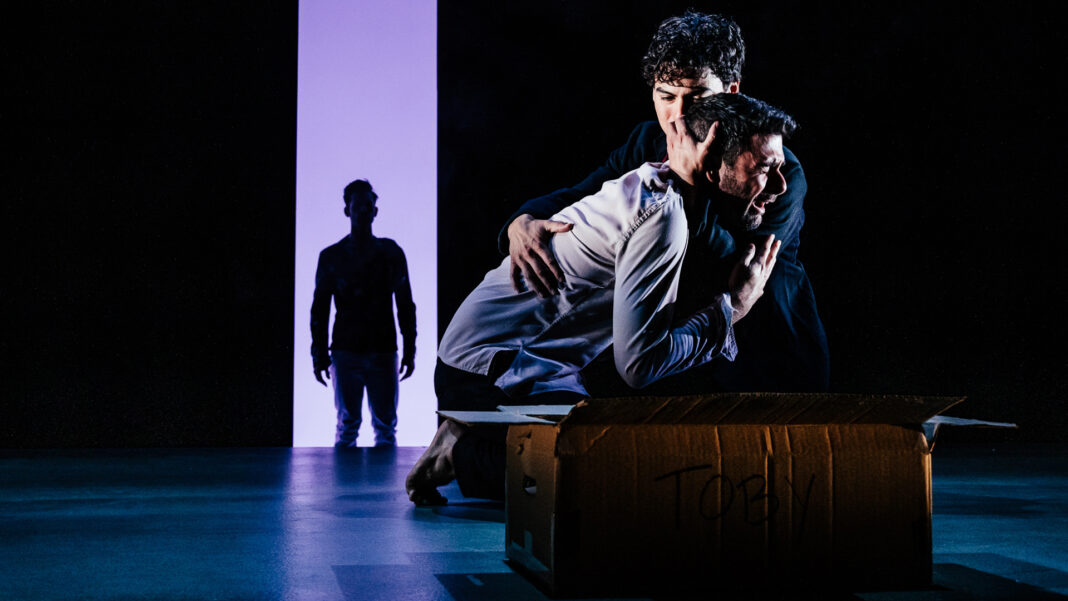
My conversation with actor Adam Kantor began in an unusual place, Polignano a Mare in Puglia on the Adriatic coast of Southern Italy. For it was from there in 2018 that he posted a photo on his Instagram account with the description, “After a mild panic attack, I did what the locals did and jumped off these cliffs and into the water.”
That proved to be an apt conversation starter when we talked about his taking on the role of Eric Glass in Matthew López’s Tony Award-winning play The Inheritance now being performed at the Geffen Playhouse in Los Angeles. It’s a mammoth work that takes approximately seven hours to perform and is presented in two parts. E.M. Forster’s Howard’s End served as the inspiration for this play about gay men in New York City in 2015-2016.
Not that Kantor suffers stage fright. He made his Broadway debut in Rent as Mark in 2008. He also appeared in Next to Normal, the 2015 revival of Fiddler on the Roof and he originated the role of Telephone Guy in The Band’s Visit. He earned a Grammy Award for the cast album of that show.
Eric is, arguably, the moral center of The Inheritance. He’s a genuine and empathetic man, but one who doesn’t quite understand the fullness of who he is and who he is meant to be.
So when I spoke last month with Kantor about taking on this part, I asked him if being in The Inheritance shares certain qualities with diving off that cliff in Puglia. What follows are excerpts from our conversation that have been edited for length and clarity.
That is an amazing first question. I hadn’t made that connection, but yes, absolutely. Oh, wow. This is a cliff dive, if I’ve ever experienced one – maybe more than anything else I’ve ever done, including that cliff dive at Polignano a Mare. This is the biggest, deepest, most profound cliff dive I think I’ve ever experienced. In so many ways: emotionally, physically, spiritually, in terms of my own vulnerability. It is by far the most vulnerable thing I’ve ever done as a queer person, as as an artist, as an actor. It feels stripped bare and unmasked in a way that I’ve never experienced in any role. It feels like therapy every night. It is maybe the most vulnerable and adrenaline-fueled, raw, electric, scary, exciting experience of my life so far.
Once you did make that dive I’m sure you came up with your own perspective on who Erik is in the play. How has that shifted or evolved through rehearsals?

I think Eric, in a lot of ways, has a deep grounding and has a sense of self that is continually evolving. His groundedness and his sense of self is something that is very important to him and I think ends up providing a lot of healing, not only to him, but to the people around him. So I am continually, throughout performances and throughout rehearsals, trying to maintain and find this sense of center, this sense of authenticity and grounding and honesty. That is something that I, myself as as a human and as an artist, am constantly trying to find and evolve and maintain focus with. So I think it’s always about truth. I know it sounds kind of maybe lofty, but, I’m wanting to maintain that sort of authenticity and truthfulness to myself into this role, because the play goes through a lot. It’s a roller coaster. So finding and maintaining a sense of balance has been really important throughout all of this.
It’s interesting the way you described Eric, because he’s described in the play as “wrong about himself in every imaginable way.” I don’t think he’s delusional in a traditional way. He simply doesn’t understand his strengths. What are the challenges of bringing that perspective that does ultimately shift by the end of the play?
I think the strengths that he has are innately in him somewhere. It is discovering them and allowing them to be at the forefront, knowing them. It’s, in a way, about the confidence of understanding that these strengths that he has can indeed shape everyone around him. And in a way change the existences of those around him for the better and allowing that to be his guiding light.
We see him losing his way a bit throughout different parts of the play in various capacities. We see him in very human ways: flying off the handle and being tempted by very human temptations, sex, money, things that might provide stability. While underneath all of that, there is this almost otherworldly ability to connect with other people and to uplift and to heal. More than anything he is a healer. We see this beautiful journey of finding and discovering that ability with lots of distractions along the way that cause a lot of pain. But he goes through it with integrity and with care and always with care for those around him.
Matthew López wrote a piece for the New York Times, in it he said of the then 200,000 ticket buyers who had seen the three productions of The Inheritance that were going on at the time that, “almost every one of those people, whether belonging to or allied with the LGBTQ community, has a story to share relating to its themes.” What are the themes that most resonate with you and perhaps with others who will see the play?
There’s so much there. I think the themes that most resonate and that we see are those of overcoming trauma. Breaking through the immense weight of shame and pain that so many of us have felt. In order, on the journey, to find authentic connection and healing and a home.
López, in that same article, said “Avoidance of uncomfortable truths is not the role of the artist. Healing is impossible if you don’t understand the cause of the injury.” Is there any way for you, Adam, in being part of this production, that is healing or restorative for you?

So, so much. To be surrounded by a group of queer artists, which I am in this production. To be able to excavate our own individual journeys of shame and self-acceptance and self-actualization – spoken or unspoken, explicit or not within the process. Whether we really delve into it within rehearsal hours or outside on lunches and breaks, etc., or whether we’ve channeled it through the text and through our work, it’s all very much alive in the room.
To be able to go through that process with a group of people – for each other and in front of strangers – has been, and will continue to be, unspeakably healing and powerful. An experience that I think will shape me and change me forever for the rest of my life.
What opportunities does finding the rhythm of his language give you that perhaps finding the rhythm of songs in a musical does not?
I’ve been very interested, actually, in the similarities that struck me yesterday in rehearsal. We were talking about two of my speeches as arias and that helped me last night go through them because I really was able to score them with a climax, if you will, and with certain intricacies and dynamics that I might approach a song. His play and his language is incredibly musical and is often quite heightened the way that a musical might be.
I’m incredibly grateful to be doing a straight play. And I’m incredibly grateful to have had all the musical experience I’ve had to bring to this play, because I think it’s helping me a lot in terms of the timing, in terms of the rhythm, in terms of the dexterity of the language; wrapping my tongue around it and shaping these speeches, which are often, I think, very musical and deeply moving. So similarities are abundant.
E.M. Forster is quoted as saying, “What is wonderful about great literature is that it transforms the man who reads it towards the condition of the man who wrote.” How does playing Eric in The Inheritance transform you?
Undeniably, undoubtedly, I feel a better person inhabiting the bare feet of Eric Glass every night, because that’s how this production was staged. In fact, the only times I’m wearing shoes are when I’ve sort of lost my way. I don’t know that I’ve ever had the privilege and opportunity of playing a character who is not only so innately good, but is on a deep and rigorous journey to find and to be the best version of him possible. One that will ultimately heal others. I don’t know that there is a greater Jewish value or a greater queer value or, frankly, a greater human value than that. To be able to inhabit that spirit daily I hope will only make me a better person, one even a fraction as good as Eric Glass is. That would be pretty wonderful.
The Inheritance runs through November 27th at the Geffen Playhouse.
Main Photo: Adam Kantor and Bradley James Tejeda in The Inheritance” (Photo by Jeff Lorch/Courtesy Geffen Playhouse)














